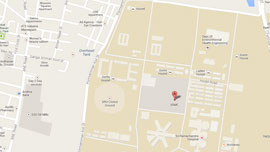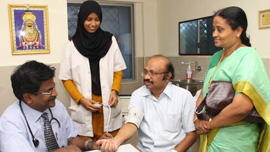Obesity Clinic
Bariatric Surgery
Obesity, a risk factor for diseases including
- Diabetes
- High blood pressure (hypertension)
- Heart disease
- Obstructive sleep apnea
- Stroke
- Infertility
- Cancer (in women: endometrial, gallbladder, cervical and uterine; in men: colorectal and prostate)
Studies show that the risk of death from these conditions drops significantly after weight loss
Obesity contributes to numerous other medical conditions, including:
- Osteoarthritis
- Gallbladder disease and gallstones
- High-risk pregnancy
- Hypoventilation (breathing disorders)
- Heartburn or acid reflux disease
- Psychological disorders/social impairments
- Polycystic ovary syndrome
- Low back pain, degenerative disc disease
What is BMI (Body Mass Index)?
It is the measure of body fat based on height & weight of the adult
| Weight Classification |
BMI |
| Ideal Weight |
18.5 - 24.9 |
| Over Weight |
25.0 - 29.9 |
| Obese (Class I) |
30.0 - 34.9 |
| Obese (Class II) |
35.0 - 39.9 |
| Clinically Severe Obesity (Class III) |
> 40.0 |
Why surgery for obesity?
Obesity is classified according to BMI. Morbid obesity is BMI >40. People with this level of obesity suffer numerous medical problems such as diabetes, sleep apnea, high blood pressure, joint disease, and high cholesterol.
While medical therapy and dietary modifications can improve weight-related problems, however they have high failure rate.
Surgical treatment has proven to be the best for long term weight loss, that means the failure rate is extremely low.
Surgery for obesity also provides better control of blood sugar and blood pressure, brings blood cholesterol to normal limits and improves exercise tolerance and sleep disorder.
Who is a candidate for weight-loss surgery?
- Candidates must have a BMI greater than 40 or greater than 40 or greater than 35 with medical Co-morbidities such as diabetes, hypertension, elevated cholesterol, degenerative joint disease, or sleep apnea.
- Age greater than 18 or less than 60 years old.
- Medically healthy enough to tolerate major surgery.
- Patients who have tried and failed with medical therapy and life style modification
- No serious underlying psychiatric disorders, substance abuse, or narcotic dependency.
- Complex medical conditions and limited mobility increase the risk of surgery and are considered on a patient-by-patient basis.
What are the options?
Laproscopic sleeve gastroectomy
It is procedure that involves the removal of major portion of the stomach. Following this the patients stomach will be significantly reduced in size, and will accompanate volume of food less than 100 ml. This is a restrictive procedure by this method the patient will loss about 40-50% of his /her excess body weight.
Laproscopic Roux
En - Y gastric bypass: this procedure involves creation of a gastric pouch which will only accomodate about 30-50 ml of food. To this pouch a loop of small intestine will be connected so that the entire stomach will be bypass by the food and it will later mix with the digestive juices lower down in the small intestines. This procedure is the both restrictive and the malabsorptive procedure. There by the patient will loss more weight compare to other procedures the patient can expect about 60-65% loss of excess body weight.
Abdominoplasty
This involves the surgical removal of excess fat in the belly a person having only a flabby belly may benefit from this procedure however recurrence rates are high. It is indicated after a weight loss surgery, once the belly starts hanging because of the weight loss.
Benefits
The medical and emotional benefits of the procedure begin almost immediately after surgery, and the cosmetic benefits follow in due time.
Over time, the benefits may include:
- Significant sustained weight loss.
- Blood-sugar levels for patients with type 2 diabetes that improve almost immediately and may become completely normal within a year of surgery.
- Significant reduction of blood pressure.
- Blood cholesterol levels will significantly reduce and may normalize in due course.
- Relief from sleep apnea and acid reflux.
- Less osteoarthritis pain and improved mobility.
- Improved mood and self-esteem.
Contact
D2 PRIVATE CLINIC
Tel : 044 45928506 (from 8.00 am to 4.00 pm)
Mr. Prabakaran - 9940494865
[email protected]













